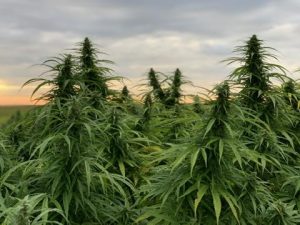Growing hemp industry drives new Midwest research project
University of Illinois Extension Services — September 19, 2020
The new Midwestern Hemp Database will help growers understand the best practices for growing and producing hemp. University of Illinois Extension staff found hemp producers are looking for research on cannabinoid levels throughout the growing season and at harvest, which is addressed in the database. (Photo courtesy of University of Illinois Extension)
Industrial hemp is a new addition to Midwestern agriculture, and producers are learning while they develop practices in real time.
To help, University of Illinois Extension commercial educators are working with growers to provide cutting-edge research through the new Midwestern Hemp Database, available at go.illinois.edu/HempDatabase.
“The database is an interactive platform, updated weekly, that helps guide growers,” said Phillip Alberti, an Illinois Extension commercial agriculture educator. “Together, we’re working to understand the performance of more than 440 industrial hemp varieties used in the Midwest and production practices.”
In the mutually beneficial project, hemp producers submit information about what they are growing directly from the field. University staff analyze and share with the public. In exchange for their involvement, growers receive discounted cannabinoid testing on samples.
“As this is a new crop, we simply do not know what is and is not working in the Midwest,” Alberti said. “This project allows us to learn a lot in a short period of time while allowing growers to conduct their own analysis.”
One of the many roles of Illinois Extension educators is to understand agricultural needs, at both the local and state level, and in response provide research-based outreach and education. Through a survey, Extension staff found hemp producer’s top concerns were a lack of information on cannabinoid levels throughout the growing season and at harvest, which is addressed in the database.
“This project puts data from around the Midwest into an easily accessible and interactive format,” Alberti said. “Growers can feel confident using this database to make informed decisions about their operation.”
The database is a collaborative project between four Midwestern land grant universities: Michigan State, University of Illinois, University of Wisconsin-Madison, and Purdue University.
The information provided by the database is open to the public and will be useful for not only processors, but also regulators. The impending adoption of USDA rules has made 2020 a valuable year to gather information that will be used in the final hemp bill, Alberti said.
“The response has been overwhelmingly positive, and we have received great comments and suggestions on improvements,” Alberti said. “We intend to build upon the work here and expand both the scope in the next year.”
Researchers hope to expand the project to include more state land grant institutions to develop a more comprehensive, regional resource. Other production topics will also be explored including terpene production and heavy metal and biological contamination.
The application period for producers to participate in submitting information is closed. Applications for 2021 will be available at go.illinois.edu/HempDatabase.







